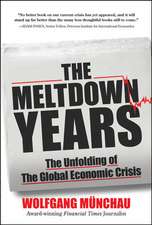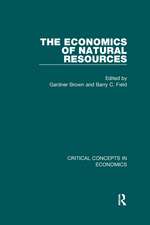ISE Environmental Economics
Autor Barry C Field, Martha K Fielden Limba Engleză Paperback – 2 mar 2020
The basic structure and sequence of chapters in this edition are unchanged although we have reorganized and updated the last section on global issues. The first section of the book is an introduction, beginning with a chapter on what environmental economics is about, followed by one on the basic relationships between the economy and the environment. The next section is devoted to studying the “tools” of analysis, the principles of demand and cost, and the elements of economic efficiency both in market and nonmarket activities. These chapters are not meant to be completely thorough treatments of these theoretical topics; however, given the objective of the book, the introductory chapters are essential. Even those who have had a course in microeconomic principles might find them valuable for purposes of review. Section 2 also contains a chapter in which these economic principles are applied to a simple model of environmental pollution control.
Section 3 is on environmental analysis. Here we look closely at some of the techniques that have been developed by environmental economists to answer some of the fundamental value questions that underlie environmental decision making. We focus especially on the principles of benefit–cost analysis. After this we move to Section 4, on the principles of environmental policy design. It begins with a short chapter dealing with the criteria we might use to evaluate policies, then moves on to chapters on the main approaches to environmental quality management.
Sections 5 and 6 contain policy chapters, where we examine current developments in environmental policy with the analytical tools developed earlier. Section 5 is devoted to environmental policy in the United States, covering federal policy on water, air, and toxic materials. It also contains a chapter on environmental issues at the state and local levels, including recycling. Finally, the last section looks at international environmental issues: global climate change, the economics of international environmental agreements, globalization, and economic development and the environment.
A collection of relevant web links and additional sources is available on the website. Also available is a tutorial for working with graphs. For instructors, the website offers an Instructor’s Manual available for easy download. To access the website associated with this book, please visit the instructor resources.
Preț: 461.20 lei
Preț vechi: 501.30 lei
-8% Nou
Puncte Express: 692
Preț estimativ în valută:
88.26€ • 91.18$ • 73.46£
88.26€ • 91.18$ • 73.46£
Carte disponibilă
Livrare economică 05-19 martie
Livrare express 18-22 februarie pentru 35.82 lei
Preluare comenzi: 021 569.72.76
Specificații
ISBN-13: 9781260575491
ISBN-10: 1260575497
Pagini: 928
Dimensiuni: 163 x 231 x 33 mm
Greutate: 0.59 kg
Ediția:8
Editura: McGraw Hill Education
Colecția McGraw-Hill
Locul publicării:United States
ISBN-10: 1260575497
Pagini: 928
Dimensiuni: 163 x 231 x 33 mm
Greutate: 0.59 kg
Ediția:8
Editura: McGraw Hill Education
Colecția McGraw-Hill
Locul publicării:United States
Cuprins
Chapter 1: What Is Environmental Economics?
Chapter 2: The Economy and the Environment
Chapter 3: Benefits and Costs, Supply and Demand
Chapter 4: Markets, Externalities, and Public Goods
Chapter 5: The Economics of Environmental Quality
Chapter 6: Frameworks of Analysis
Chapter 7: Benefit–Cost Analysis: Benefits
Chapter 8: Benefit–Cost Analysis: Costs
Chapter 9: Criteria for Evaluating Environmental Policies
Chapter 10: Decentralized Policies: Liability Laws, Property Rights, Voluntary Action
Chapter 11: Command-and-Control Strategies: The Case of Standards
Chapter 12: Incentive-Based Strategies: Environmental Charges and Subsidies
Chapter 13: Incentive-Based Strategies: Market Trading Systems
Chapter 14: Federal Water Pollution– Control Policy
Chapter 15: Federal Air Pollution—Control Policy
Chapter 16: Federal Policy on Toxic and Hazardous Substances
Chapter 17: State and Local Environmental Issues
Chapter 18: Global Climate Change
Chapter 19: International Environmental Agreements
Chapter 20: Globalization
Chapter 21: Economic Development and the Environment
Chapter 2: The Economy and the Environment
Chapter 3: Benefits and Costs, Supply and Demand
Chapter 4: Markets, Externalities, and Public Goods
Chapter 5: The Economics of Environmental Quality
Chapter 6: Frameworks of Analysis
Chapter 7: Benefit–Cost Analysis: Benefits
Chapter 8: Benefit–Cost Analysis: Costs
Chapter 9: Criteria for Evaluating Environmental Policies
Chapter 10: Decentralized Policies: Liability Laws, Property Rights, Voluntary Action
Chapter 11: Command-and-Control Strategies: The Case of Standards
Chapter 12: Incentive-Based Strategies: Environmental Charges and Subsidies
Chapter 13: Incentive-Based Strategies: Market Trading Systems
Chapter 14: Federal Water Pollution– Control Policy
Chapter 15: Federal Air Pollution—Control Policy
Chapter 16: Federal Policy on Toxic and Hazardous Substances
Chapter 17: State and Local Environmental Issues
Chapter 18: Global Climate Change
Chapter 19: International Environmental Agreements
Chapter 20: Globalization
Chapter 21: Economic Development and the Environment










